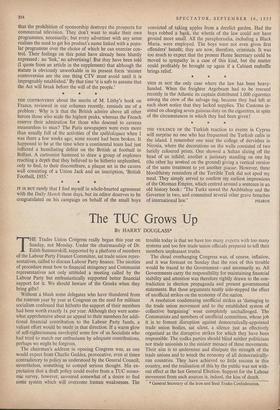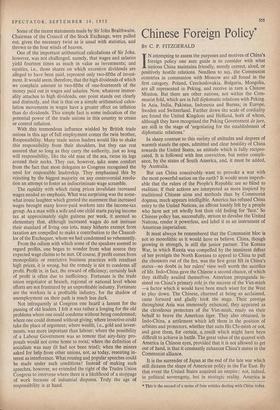The TUC Grows Up
BY HARRY DOUGLASS* THE Trades Union Congress really began this year on Sunday, not Monday. Under the chairmanship of Dr. Edith Summerskill, supported by a platform of members of the Labour Party Finance Committee, sat trade union repre- sentatives, called to discuss Labour Party finance. The niceties of procedure must bow to financial stringency and Communist representatives not only attended a meeting called by the Labour Party but enthusiastically supported better financial support for it. We should beware of the Greeks when they bring gifts!
Without a blush some delegates who have thundered from the rostrum year by year at Congress on the need for militant socialism confessed that hitherto the support of their members had been worth exactly Is. per year. Although they were some- what apprehensive about an appeal to their members for addi- tional financial contribution to the Labour Party funds, a valiant effort would be made in that direction. If a warm-glow of self-righteousness enveloped some few of us Socialists who had tried to match our enthusiasm by adequate contributions, perhaps we might be forgiven.
The chairman's address in opening Congress was, as one would expect from Charlie Geddes, provocative, even at times contradictory to policy as understood by the General Council; nevertheless, something to compel serious thought. His ex- pectation that a draft policy could evolve from a TUC econo- mic survey, however, savoured somewhat of a desire to find some system which will overcome human weaknesses. The trouble today is that we have too many experts with too many systems and too few trade union officials prepared to tell their members unpleasant truths.
The cloud overhanging Congress was, of course, inflation, and it was forecast on Sunday that the root of this trouble would be traced to the Government—and necessarily so. All Governments carry the responsibility for maintaining financial stability and attention was therefore rightly drawn to the con- tradiction in election propaganda and present governmental statements. But these arguments neatly side-stepped the effect of unofficial strikes on the economy of the nation.
A resolution condemning unofficial strikes as 'damaging to the trade union movement and to the established system of collective bargaining' went completely unchallenged. The Communists and members of unofficial committees, whose job it is to foment disruption against democratically-appointed trade union bodies, sat silent, a silence just as effectively organised as the disruptive strikes for which they have been responsible. The vodka parties should blind neither politicians nor trade unionists to, the sinister menace of these movements. Their aim is to undermine and dissipate the strength of the trade unions and to wreck the economy of all democratically- run countries. They have achieved no little success in this country, and the realisation of this by the public was not with- out effect at the last General Election. Support for the Labour movement from such sources is, indeed, the kiss of death.
* General Secretary of the Iron and Steel Trades Confederation.
Some of the recent statements made by Sir John Braithwaite, Chairman of the Council of the Stock Exchange, were pulled out, given the necessary twist as is usual with statistics, and thrown to the four winds of heaven.
One of the important arithmetical calculations of Sir John, however, was not challenged, namely, that wages and salaries yield fourteen times as much in value as investments; and equities, i.e., those shares on which excessive dividends are alleged to have been paid, represent only two-fifths of invest- ment. It would seem, therefore, that the high dividends of which we complain amount to two-fifths of one-fourteenth of the money paid out in wages and salaries. Now, whatever immor- ality attaches to high dividends, one point stands out clearly and distinctly, and that is that on a simple arithmetical calcu- lation movements in wages have a greater effect on inflation than do dividends. This simple fact is some indication of the potential power of the trade unions in this country to create or control inflation.
With this tremendous influence wielded by British trade unions in this age of full employment comes the twin brother, Responsibility. Many trade union leaders would like to shake this responsibility from their shoulders, but they can rest assured that so long as they carry the authority, just so long will responsibility, like the old man of the sea, twine its legs around their necks. They can, however, take some comfort from the fact that most delegates to Congress recognised the need for responsible leadership. They emphasised this by rejecting by the biggest majority on any controversial resolu- tion an attempt to foster an indiscriminate wage scramble.
The rapidity with which rising prices invalidate increased wages needed no emphasis. What was surprising was the some- what ironic laughter which greeted the statement that increased wages brought many lower-paid workers into the income-tax group. As a man with a wife and one child starts paying income tax at approximately eight guineas per week, it seemed so elementary that, although increased wages do not increase their standard of living one iota, many hitherto exempt from taxation are compelled to make a contribution to the Chancel- lor of the Exchequer, Whom we had condemned so vehemently.
From the odium with which some of the speakers seemed to regard profits, one began to wonder from what source they expected wage claims to be met. Of course, if profit comes from monopolistic or restrictive business practices with resultant high prices, it is wrong, but the remedy is not to condemn all profit. Profit is, in fact, the reward of efficiency; certainly lack of profit is often due to inefficiency. Fortunate is the trade union negotiator at branch, regional or national level whose efforts are not frustrated by an unprofitable industry. Fortunate are the workers in a profitable industry, for the shadow of unemployment on their path is much less dark.
Not infrequently at Congress one heard a lament for the passing of old leaders. I felt it was rather a longing for the old problems where one could condemn without being condemned; where one could demand without giving; where invective could take the place of argument; where wealth, i.e., gold and invest- ments, was more important than labour; where the possibility of a Labour Government was so remote that airy-fairy pro- posals would not come home to roost; where the definition of socialism was easy (it had not been tried); when the miners asked for help from other unions, not, as today, resenting in- terest as interference. What rousing and popular speeches could be made under such conditions! Instead of making such speeches, however, we extended the right of the Trades Union Congress to intervene where there is a likelihood of a stoppage of work because of industrial disputes. Truly the age of responsibility is at hand.



































 Previous page
Previous page